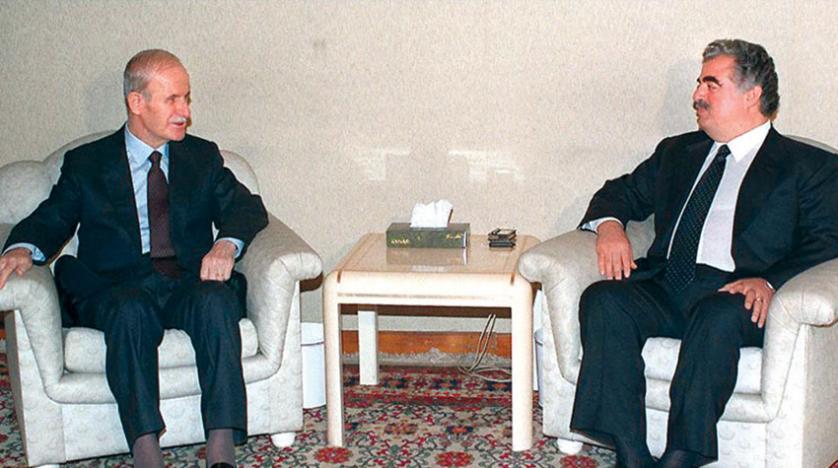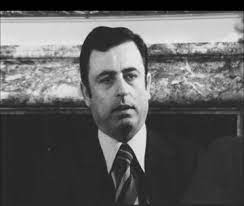The former deputy to the head of the Assad regime, “Abdul-Halim Khaddam,” focused in his memoirs published by the “Al-Sharq Al-Awsat” newspaper on the third day on his relationship with the late Lebanese Prime Minister Rafik Hariri and the conversations between them. This spans from Hafez al-Assad’s approval for Hariri to form the Lebanese government in 1992, leading to tension between Bashar and Hariri, and ultimately Hariri’s assassination in 2005.
Khaddam spoke about his frequent meetings with Hariri since their first encounter in 1982. During these encounters, Khaddam tried to understand Hariri’s aspirations, his connections to the Lebanese issue, and the reasons and circumstances behind them. In these meetings, Hariri discussed his upbringing, the circumstances he went through, his affiliation with the “Arab Nationalist Movement,” and his journey to work in Saudi Arabia.
Hariri used to visit Damascus weekly, sometimes for discussions on the Lebanese national issue and at other times carrying messages from the late King Fahd bin Abdulaziz to Hafez al-Assad.
Khaddam recounted how Hafez conducted a “test” for Hariri before approving the formation of the government in 1992. Suddenly, he asked him, “If you were the Prime Minister of Lebanon and we had a disagreement with Saudi Arabia, how would you act?” Hariri replied, “Your Excellency, I am Lebanese, and I love my country. At the same time, I am Saudi, and my backbone is from the Kingdom of Saudi Arabia. Therefore, I cannot abandon Saudi Arabia because I am not ungrateful. As an Arab nationalist, I consider Syria the protector of the Arabs, and I can only stand with Syria. So, if a dispute arises, I will work to resolve it and restore things to normal. If I fail, I will resign and live in my house.”
Campaigns against Hariri
Khaddam confirmed that based on his response, Hafez asked him to inform the Lebanese President that he supports Rafik Hariri’s nomination to form the government. Following this, Hariri became the Prime Minister of Lebanon. Khaddam added that Hariri committed to every word he said in front of him and Hafez. Hariri provided significant services to Syria through his foreign relations, and he gifted Syria by constructing the “Conference Palace” and the associated hotel. He also completed the construction of the new presidential palace.
Khaddam then delved into his memoirs regarding the security campaigns against President Hariri. These campaigns intensified after Hafez al-Assad’s death in 2000, and Bashar assumed power. Bashar initiated a campaign against Hariri, influenced by a group of Lebanese individuals who were previously associated with his brother Bassel and had interests in the Lebanese state.
Khaddam explained that the campaigns against Hariri led to increased isolation for Bashar both regionally and internationally, prompting him to seek support from Iran.
He then moved on to discuss Bashar’s insistence on extending the term of Lebanese President Emile Lahoud and pressuring Hariri to agree to the extension. However, after Hariri announced his resignation from the government, Bashar summoned him. When asked about his conditions for rescinding his resignation, Hariri responded: “A national reconciliation meeting, a government of national unity with the participation of everyone without exception, freedom in decision-making, and President Lahoud not interfering in government affairs.” Bashar accepted his demands, including having Suleiman Frangieh in the next ministerial lineup, and Hariri did not object.
Khaddam’s request for Hariri to leave Lebanon
Khaddam then spoke about the attempt to assassinate Marwan Hamadeh and Hariri’s apology for not forming the government more than a month after being assigned, due to the campaigns launched by Bashar’s supporters in Lebanon at his behest against Hariri without any justification.
According to the memoirs, the leadership of the Ba’ath Party held a meeting in mid-January 2005, during which al-Assad stated, “I will speak about Lebanon. There is an American-French conspiracy in which Hariri is involved, conspiring against us. He is rallying his sect around him, and this poses a danger to Syria.”
Khaddam affirmed that the next day, Mohsen Dalloul, who had strong ties with Hariri, received him. Khaddam asked him to inform Hariri that he must leave Lebanon immediately because there is significant animosity towards him.
In early February 2005, Khaddam recounted the conversation between him and Hariri when he visited Beirut before the assassination. Hariri asked him about the topic Mohsen informed him of, and Khaddam responded, “Bashar’s message was clear, and the punishment for the accusation of conspiracy is death. Therefore, you must leave Beirut today or tomorrow.” Hariri asked, “What is the relationship between Bashar and his brother Maher? Are there disagreements between them?” Khaddam replied, “There are no disagreements.” Hariri said, “Maher sent me a message, saying: ‘We love you and will support you. When you come to Damascus, expect our visit. We want your support.’ Why would they send such a message if they intend to kill me?” Khaddam replied, “Maher’s message aims to keep you in Lebanon until they carry out their crime.” After we had lunch, I bid him farewell, urging him to expedite his travel. He replied, “But I have the vote on the election law.” I said to him, “Father Bahaa, what is more important: your life or the elections? If you leave, you can work for the benefit of Lebanon. If you stay, they will carry out the crime.”
Khaddam mentioned that on February 14, he had a meeting with the Qatari leadership and was surprised when he heard on television about the news of a large bomb exploding in front of Hariri’s convoy, resulting in his death. He pointed out that he was with a leadership member at the time, who said to him, “They carried out what was discussed in the leadership,” referring to Bashar’s threat to Hariri.


